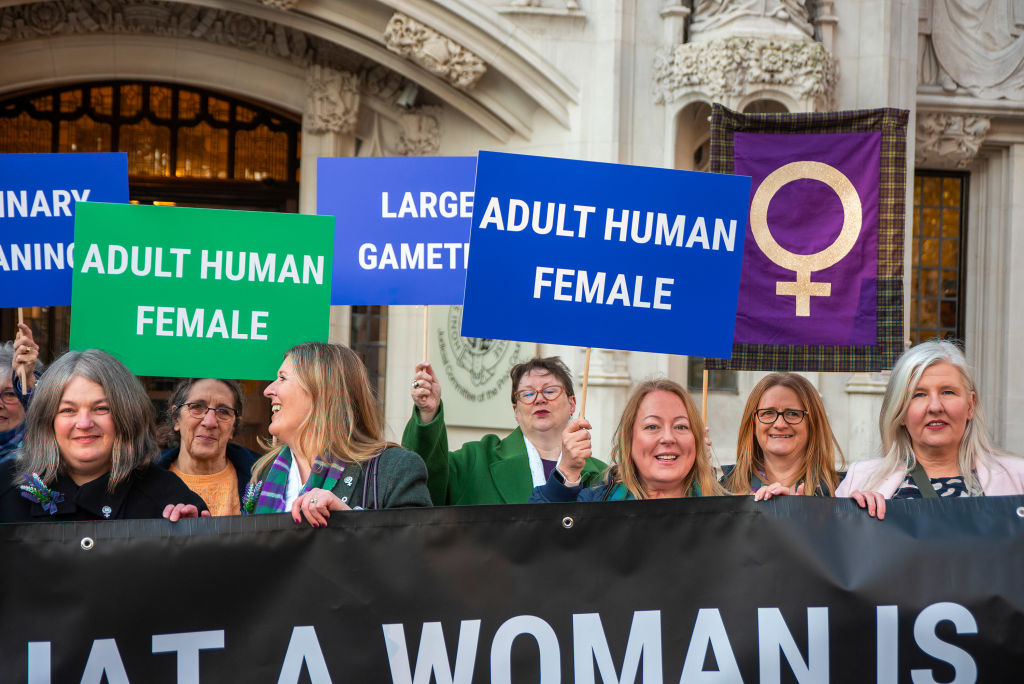Westminster
Yesterday, I made my way to court to witness a case that will hopefully establish in law an important question: what is a woman? If we lose the case, we lose our rights as women, in law and in policy. The work of decades could be undone all too quickly.
The case began in 2018, when the Scottish Government passed a law which took as its definition of “woman” anyone who identifies as one. An advocacy group, For Women Scotland, challenged this in court and won. But then the Scottish National Party replaced this with guidance suggesting the definition of a woman in the Equality Act 2010 is not just a person born female, but is also changed “for all purposes” by the Gender Recognition Act. Last year, For Women Scotland went to court once again to challenge that definition — but lost. The group’s appeal will now be decided by the Supreme Court.
Inside the packed courtroom were a range of women’s rights groups and associated activists, all of whom have been attacked and labelled “terfs” for their beliefs in the past. Sex Matters, Scottish Lesbians, the Lesbian Project — which I co-direct with Kathleen Stock — and the LGB Alliance were all present. Meanwhile, Amnesty International and the EHRC (Equality and Human Rights Commission) have lent their support to the Scottish Government.
Much of the build-up to the case has focused on a particular detail in the Scottish Government’s submission, which claims that maternity provisions can be extended to “pregnant men”. Aidan O’Neill KC, representing For Women Scotland, said in court this week that those two words are a “legal fiction”. And yesterday, far away from the Supreme Court in London, O’Neill received support from an unexpected source. During a press conference in Edinburgh, Scottish First Minister John Swinney stated, in response to a journalist’s question, that males cannot become pregnant. Seated next to me in Courtroom 1 yesterday was former SNP MP Joanna Cherry, who noted online: “I am pleased that John recognises this biological reality, but I’m presently sitting in the UK Supreme Court watching his Government’s lawyers argue the opposite.”
Yet there is another important aspect to this case: namely, the right of lesbian clubs to legally exclude trans-identified males. A lawyer representing the Scottish Government, Ruth Crawford KC, denied that obstructing this right would create a “chilling effect”. On top of this, she claimed that the “inevitable conclusion” of a For Women Scotland victory would be that male-born holders of a GRC — who, she argued, are seen as having changed sex in the eyes of the law — would “remain men until death for the purposes of the Equality Act”.
High comedy was on offer amid arguments about heterosexual men with a Gender Recognition Certificate (GRC) becoming lesbians, while those without a GRC remain heterosexual men. The utter absurdity, sexism and homophobia of the gender identity argument is being clearly exposed in Britain’s premier court. Regardless of the result inside the courtroom, more people will surely be convinced that the Scottish Government’s case is a ludicrous — and dangerous — fiction.











Join the discussion
Join like minded readers that support our journalism by becoming a paid subscriber
To join the discussion in the comments, become a paid subscriber.
Join like minded readers that support our journalism, read unlimited articles and enjoy other subscriber-only benefits.
Subscribe